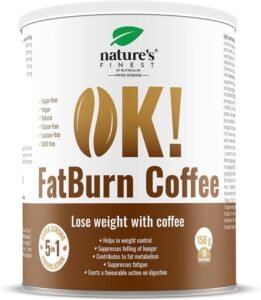Can i Lose Weight Drinking Coffee
Introduction:
In the quest for shedding those stubborn pounds, individuals often turn to various methods, seeking the elusive solution to weight loss. Among the array of strategies, one contender that frequently emerges is coffee. The aromatic beverage has long been a staple in many cultures, cherished for its rich flavor and energizing properties. But amidst the morning rituals and midday pick-me-ups, a burning question arises: can drinking coffee truly aid in weight loss?

Understanding Coffee and Metabolism
Coffee, revered for its stimulating effects, owes much of its potency to caffeine, a natural compound found within its beans. Caffeine, a renowned stimulant, holds the power to invigorate the mind and body, igniting a surge of energy and alertness upon consumption. One of its most intriguing effects lies in its ability to influence metabolic rate—the rate at which the body expends energy to sustain vital functions.
Research has shown that caffeine can stimulate the central nervous system, prompting the release of neurotransmitters such as dopamine and norepinephrine. These neurotransmitters play a pivotal role in modulating metabolic activity, influencing processes such as thermogenesis—the production of heat by the body—and lipolysis—the breakdown of fat molecules for energy.
To illustrate the potential impact of coffee and caffeine on metabolism, consider the following comparison:
| Aspect | Effect |
|---|---|
| Metabolic Rate | Elevated |
| Thermogenesis | Increased |
| Lipolysis | Enhanced |
In summary, the relationship between coffee consumption, caffeine, and metabolism is complex and multifaceted. While coffee may offer potential benefits for weight management through its effects on metabolic processes, individual responses can vary. It is essential to consider factors such as tolerance, overall dietary patterns, and lifestyle habits when incorporating coffee into a weight loss regimen.
 |  |  |
The Role of Caffeine in Fat Burning
Delving deeper into the realm of fat metabolism, caffeine emerges as a prominent player in the intricate process of lipolysis—the breakdown of fat molecules within adipose tissue. Through its interactions with various cellular mechanisms, caffeine stimulates the release of fatty acids into the bloodstream, thereby facilitating their utilization as a source of energy.
Caffeine achieves this by inhibiting the activity of phosphodiesterase, an enzyme responsible for breaking down cyclic adenosine monophosphate (cAMP). By inhibiting phosphodiesterase, caffeine prolongs the action of cAMP, which in turn activates hormone-sensitive lipase—an enzyme crucial for the breakdown of triglycerides stored in fat cells.
To elucidate the role of caffeine in fat burning, consider the following comparison:
| Aspect | Effect |
|---|---|
| Lipolysis | Enhanced |
| Release of Fatty Acids | Increased |
| Activation of Hormone-Sensitive Lipase | Stimulated |
This table outlines the potential effects of caffeine on fat burning processes. It suggests that caffeine consumption may enhance lipolysis, increase the release of fatty acids into the bloodstream, and stimulate the activation of hormone-sensitive lipase—an enzymatic cascade that promotes the breakdown of stored fat for energy production.
In conclusion, the inclusion of caffeine-rich beverages such as coffee in a weight loss regimen may offer benefits by enhancing fat metabolism and facilitating the utilization of stored fat as an energy source. However, individual responses to caffeine can vary, and it is essential to consider factors such as tolerance and overall dietary habits when incorporating caffeine into a weight management plan.
 |
|
Impact of Coffee on Resting Metabolic Rate (RMR)
Beyond the realms of activity-induced calorie expenditure, the influence of coffee extends to the resting metabolic rate (RMR)—the energy expended by the body at rest to maintain essential functions. Research suggests that the consumption of coffee, particularly caffeinated variants, may exert a modest yet discernible effect on RMR, thereby augmenting overall calorie burning throughout the day.
Studies have shown that caffeine, the primary bioactive component in coffee, can elicit a thermogenic response when ingested, leading to an increase in metabolic rate even during periods of rest. This heightened metabolic activity is thought to stem from caffeine’s ability to stimulate the sympathetic nervous system, triggering the release of catecholamines such as adrenaline, which in turn, promote thermogenesis and energy expenditure.
To illustrate the potential impact of coffee on resting metabolic rate, consider the following comparison:
| Aspect | Effect |
|---|---|
| Resting Metabolic Rate (RMR) | Elevated |
| Calorie Burning | Increased |
| Thermogenic Response | Enhanced |
This table delineates the potential effects of coffee consumption on resting metabolic rate and associated parameters. It suggests that the intake of caffeinated coffee may lead to an elevation in RMR, an increase in overall calorie burning, and an enhancement of the thermogenic response, thereby contributing to weight management efforts.
In summary, while the impact of coffee on resting metabolic rate may not be as pronounced as that observed during physical activity, its cumulative effect over time can still contribute to favorable changes in body composition and energy balance. However, individual responses to caffeine may vary, and it is essential to consider factors such as tolerance and overall lifestyle when incorporating coffee into a weight loss regimen.
Coffee and Exercise Performance
In the realm of physical performance, coffee emerges as a potent ally, capable of enhancing both energy levels and endurance. The energizing effects of caffeine can significantly bolster exercise performance, sharpening focus, and attenuating perceived exertion during strenuous activities. Moreover, coffee consumption prior to workouts has been linked to heightened fat oxidation, potentially maximizing the efficacy of exercise as a weight loss strategy.
Caffeine, the key bioactive compound in coffee, acts as a central nervous system stimulant, modulating neurotransmitter activity to promote alertness and reduce feelings of fatigue. By blocking adenosine receptors in the brain, caffeine prevents the onset of drowsiness and enhances cognitive function, allowing individuals to sustain physical activity for longer durations with greater intensity.
To elucidate the potential benefits of coffee on exercise performance, consider the following comparison:
| Aspect | Effect |
|---|---|
| Energy Levels | Heightened |
| Endurance | Enhanced |
| Fat Oxidation | Increased |
This table outlines the potential effects of coffee consumption on exercise performance. It suggests that coffee intake may lead to heightened energy levels, enhanced endurance, and increased fat oxidation, all of which can contribute to improved athletic performance and support weight loss goals.
incorporating coffee into pre-exercise routines may offer advantages in terms of performance enhancement and fat utilization during physical activity. However, individual responses to caffeine can vary, and it is essential to consider factors such as tolerance, timing, and personal preferences when utilizing coffee as a supplement for exercise.

Tolerance and Long-Term Effects
While the allure of coffee as a weight loss aid is undeniable, it is imperative to acknowledge the nuances of tolerance and long-term effects associated with its consumption. Over time, regular coffee drinkers may develop a degree of tolerance to caffeine, necessitating higher doses to elicit the same effects. Furthermore, excessive intake of coffee or reliance on caffeinated beverages as a primary means of weight management may inadvertently lead to undesirable consequences, including disrupted sleep patterns and heightened anxiety.
Tolerance to caffeine can develop due to the body’s adaptation to its effects, resulting in a diminished response to the stimulant properties of coffee. This phenomenon may necessitate increased consumption to achieve the desired level of alertness or performance enhancement, potentially leading to a cycle of escalating intake and tolerance development.
Moreover, prolonged and excessive consumption of caffeine-rich beverages such as coffee can have detrimental effects on overall health and well-being. Chronic caffeine intake has been associated with insomnia, nervousness, gastrointestinal disturbances, and cardiovascular issues in susceptible individuals. Additionally, reliance on caffeine as a primary strategy for weight management may detract from adopting more sustainable and holistic approaches to healthy living.
To illustrate the potential tolerance and long-term effects of coffee consumption, consider the following comparison:
| Aspect | Effect |
|---|---|
| Tolerance | Developed over time |
| Long-Term Health | Dependent on moderation |
| Side Effects | Potential for insomnia, anxiety, gastrointestinal issues |
This table delineates the potential tolerance and long-term effects associated with coffee consumption. It suggests that while tolerance to caffeine may develop over time, the overall impact on long-term health and well-being depends on moderation and prudent consumption practices.
In summary, while coffee can be a flavorful and enjoyable addition to a healthy lifestyle, it is essential to approach its consumption with mindfulness and moderation. Balancing the potential benefits of coffee with awareness of individual tolerance levels and long-term health considerations is key to harnessing its potential as a tool for weight management and overall well-being.
The pros and cons of drinking coffee for weight loss
| Pros | Cons |
|---|---|
| Increased metabolic rate | Development of tolerance to caffeine over time |
| Enhanced fat burning | Potential for disrupted sleep patterns |
| Elevated energy levels | Risk of heightened anxiety or nervousness |
| Improved exercise performance | Possible gastrointestinal disturbances |
| May serve as a pre-workout aid | Dependency on caffeine for weight management |
While coffee can offer advantages such as increased metabolic rate, enhanced fat burning, elevated energy levels, and improved exercise performance, it is essential to consider potential drawbacks such as the development of caffeine tolerance, disrupted sleep patterns, heightened anxiety, gastrointestinal disturbances, and the risk of dependency on caffeine for weight management.
Conclusion:
In the pursuit of weight loss, the role of coffee emerges as a multifaceted consideration, offering both promise and caution. The consumption of coffee, rich in caffeine, presents numerous potential benefits, including heightened metabolic rate, enhanced fat burning, elevated energy levels, and improved exercise performance. These attributes position coffee as a compelling ally in the quest for a healthier body composition.
However, it is essential to approach coffee consumption for weight loss with mindfulness and moderation. While coffee can offer significant advantages, it also carries potential drawbacks, such as the development of tolerance to caffeine, disrupted sleep patterns, heightened anxiety, gastrointestinal disturbances, and the risk of dependency on caffeine for weight management.
Ultimately, the efficacy of coffee as a tool for weight loss hinges on prudent consumption practices, balanced with awareness of individual tolerance levels and long-term health considerations. When integrated thoughtfully into a comprehensive regimen of diet and exercise, coffee can indeed serve as a flavorful and enjoyable component of a holistic approach to achieving and maintaining a healthier weight.

